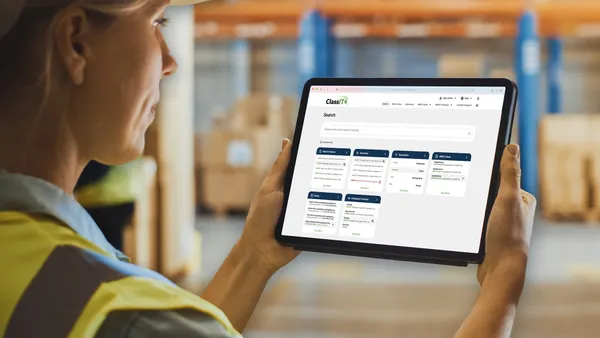Dive Brief:
- SML-RFID, an RFID retail inventory management company, told Supply Chain Dive that RFID tags will garner about 8% of the retail apparel market by the end of 2017, while the RFID market continues to grow 30% year over year.
- According to SML, RFID tags improve inventory accuracy by more than 98%, as opposed to "usually less than 70% in store."
- As Supply Chain Digest notes, RFID tagging is becoming increasingly popular on multiple levels for supply chain usage, even as implants in human hands to accelerate processes and reduce time spent on repetitious tasks.
Dive Insight:
As retailers seek to improve their omnichannel options for consumers, RFID tagging is gaining credence as a reliable way to streamline supply chains and better control inventory movement and levels.
Macy's has already announced its plan to tag all its inventory by the end of the year, and Target has already said that tagging its inventory has increased its online sales up to 50%. Although 96% of retailers use RFID to tag apparel, they can use the tech to tag other types of inventory. As a recent study by CRMBuyer shows, only 35% of retailers showed consumers available inventory online, and while 97% of retailers could view inventory levels online themselves, only 33% had the mobile tech to do so.
RFID tagging can slash those stats, and SML's Dean Frew told Supply Chain Dive that the method is likely to emerge as the leading inventory management technology. "As omnichannel models become more critical for retailers, inventory accuracy strategies must change and RFID is emerging as the only viable option," Frew said in an email to Supply Chain Dive.
But Frew said there are still challenges to the widespread implementation of RFID tagging, and the main problem is intense complexity.
"RFID implementations involve a lot of different stakeholders in a retail organization and getting those aligned take intentionality and focus on the return on investment to the organization," Frew said. "Second, we as a technology community have made it seem more complex than it needs to be. As best practices are being discussed openly, we see both of these barriers to adoption being reduced."
The solution, it seems, is to make RFID tagging more accessible and attractive to retailers. One potential setback to persuading retailers to see RFID as attractive is the fact that some companies are implanting RFID tags in their employees' hands to bypass the use of physical and computer keys, locks and codes.
While RFID chips inside human hands could certainly streamline supply chain processes — again, by reducing the number of repetitious or mundane tasks via a combination of human effort and automation — many aren't on board with the idea, citing post-apocolyptic conspiracy theories that are rooted in valid privacy concerns.
But RFID tagging doesn't have a bad rap among retailers — in fact, as Frew noted, its popularity is likely to grow as more companies follow the lead of Target and Macy's.













